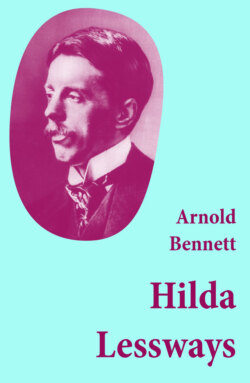Читать книгу Hilda Lessways (Unabridged) - Arnold Bennett - Страница 31
На сайте Литреса книга снята с продажи.
ii
ОглавлениеHilda was no longer in a nameless trouble. She no longer wanted she knew not what. She knew beyond all questioning that she had found that which she had wanted. For nearly a year she had had lessons in phonography from Miss Dayson’s nephew, often as a member of a varying night-class, and sometimes alone during the day. She could not write shorthand as well as Mr. Dayson, and she never would, for Mr. Dayson had the shorthand soul; but, as the result of sustained and terrific effort, she could write it pretty well. She had grappled with Isaac Pitman as with Apollyon and had not been worsted. She could scarcely believe that in class she had taken down at the rate of ninety words a minute Mr. Dayson’s purposely difficult political speechifyings (which always contained the phrase ‘capital punishment,’ because ‘capital punishment’ was a famous grammalogue); but it was so, Mr. Dayson’s watch proved it.
About half-way through the period of study, she had learnt from Mr. Cannon, on one of his rare visits to her mother’s, something about his long-matured scheme for a new local paper. She had at once divined that he meant to offer her some kind of a situation in the enterprise, and she was right. Gratitude filled her. Mrs. Lessways, being one of your happy-go-lucky, broad-minded women, with an experimental disposition—a disposition to let things alone and see how they will turn out—had made little objection, though she was not encouraging.
Instantly the newspaper had become the chief article of Hilda’s faith. She accepted the idea of it as a nun accepts the sacred wafer, in ecstasy. Yet she knew little about it. She was aware that Mr. Cannon meant to establish it first as a weekly, and then, when it had grown, to transform it into a daily and wage war with that powerful monopolist, The Staffordshire Signal, which from its offices at Hanbridge covered the entire district. The original title had been The Turnhill Guardian and Five Towns General Chronicle, and she had approved it; but when Mr. Cannon, with a view to the intended development, had inverted the title to The Five Towns Chronicle and Turnhill Guardian, she had enthusiastically applauded his deep wisdom. Also she had applauded his project of moving, later on, to Hanbridge, the natural centre of the Five Towns. This was nearly the limit of her knowledge. She neither knew nor cared anything about the resources or the politics or the programme or the prospects of the paper. To her all newspapers were much alike. She did not even explore, in meditation, the extraordinary psychology of Mr. Cannon—the man whose original energy and restless love of initiative was leading him to found a newspaper on the top of a successful but audaciously irregular practice as a lawyer. She incuriously and with religious admiration accepted Mr. Cannon as she accepted the idea of the paper. And being, of course, entirely ignorant of journalism, she was not in a position to criticize the organizing arrangements of the newspaper. Not that these would have seemed excessively peculiar to anybody familiar with the haphazard improvisations of minor journalism in the provinces! She had indeed, in her innocence, imagined that the basic fact of a newspaper enterprise would be a printing-press; but when Mr. Dayson, who had been on The Signal and on sundry country papers in Shropshire, assured her that the majority of weekly sheets were printed on jobbing presses in private hands, she corrected her foolish notion.
Her sole interest—but it was tremendous!—lay in what she herself had to do—namely, take down from dictation, transcribe, copy, classify, and keep letters and documents, and occasionally correct proofs. All beyond this was misty for her, and she never adjusted her sight in order to pierce the mist.
Save for her desire to perfect herself in her duties, she had no desire. She was content. In the dismal, dirty, untidy, untidiable, uncomfortable office, arctic near the windows, and tropic near the stove, with dust on her dress and ink on her fingers and the fumes of gas in her quivering nostrils, and her mind strained and racked by an exaggerated sense of her responsibilities, she was in heaven! She who so vehemently objected to the squalid mess of the business of domesticity, revelled in the squalid mess of this business. She whose heart would revolt because Florrie’s work was never done, was delighted to wait all hours on the convenience of men who seemed to be the very incarnation of incalculable change and caprice. And what was she? Nothing but a clerk, at a commencing salary of fifteen shillings per week! Ah! but she was a priestess! She had a vocation which was unsoiled by the economic excuse. She was a pioneer. No young woman had ever done what she was doing. She was the only girl in the Five Towns who knew shorthand. And in a fortnight (they said) the paper was to come out!
